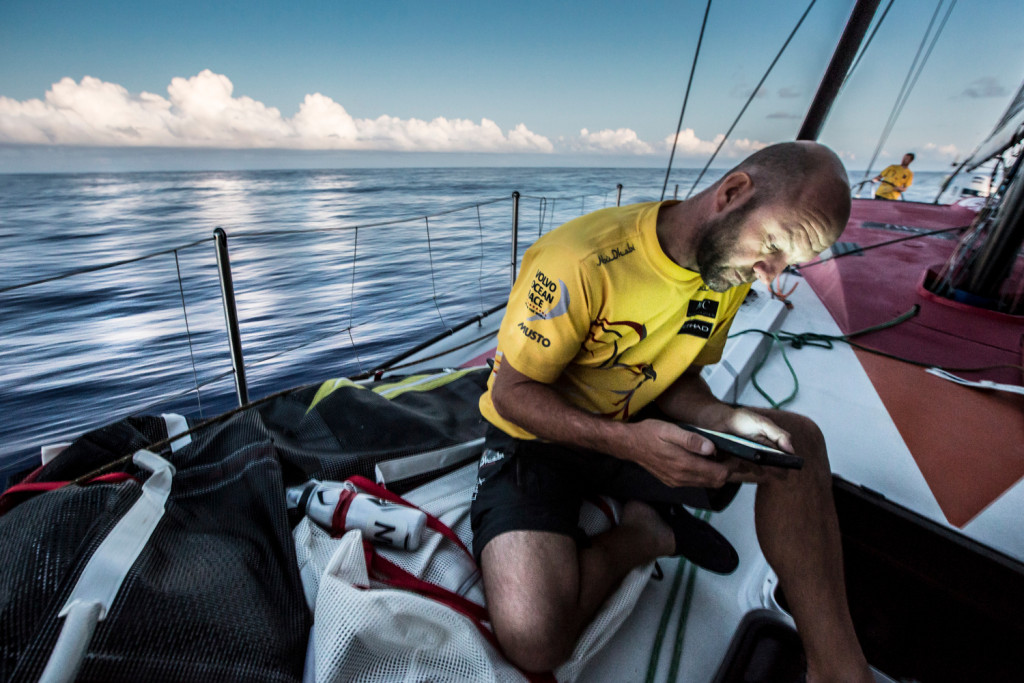
The Volvo Ocean Race finally headed for the ‘homeward’ stretch after crossing the Equator for the fourth and final time on Tuesday – but there was no room to celebrate with a major decision facing all the boats in the next 24 hours (full story below).
– Fleet crosses the Equator for final time
– Big routing decision facing navigators
– Follow what they opt to do on our great App
ALICANTE, Spain, April 28 – The Volvo Ocean Race finally headed for the ‘homeward’ stretch after crossing the Equator for the fourth and final time on Tuesday – but there was no room to celebrate with a major decision facing all the boats in the next 24 hours.
The fleet still has a long way to go before the race reaches its climax in the final week of June in Gothenburg, Sweden, having set out on the 38,739-nautical mile (nm), nine-month marathon back in Alicante, Spain, on October 11.
But it has made its farewells to the Southern Hemisphere for the final time in this edition, with all six boats tightly bunched as they entered the north Atlantic with just under 3,000nm still to race in Leg 6 before arriving in Newport, Rhode Island, USA, around May 7.
Team Brunel (Bouwe Bekking/NED) held a narrow lead of 4.1nm from Dongfeng Race Team (Charles Caudrelier/FRA) and MAPFRE (Xabi Fernández/ESP) with overall race leaders Abu Dhabi Ocean Racing (Ian Walker/GBR), Team SCA (Sam Davies/GBR) and Team Alvimedica (Charlie Enright/USA) still very much in contention (see panel above).
The fleet is heading for an area of light winds before entering what official race meteorologist, Gonzalo Infante (ESP), described as a ‘cone of possibilities and decisions’.
Each skipper and his navigator will need to decide whether east or west – or something in between – is the best direction and stick to that course. “It’s like arriving at a junction and having a variety of decisions about which road to take,” Infante explained.
“After they take an option, that route will not intersect with the others until they reach Newport. Mind you, it could be that they all take the same route.”
Meanwhile, several sailors were taking stock of passing the Equator and, effectively, completing a navigation of the globe – although this round-the-world race still has to take in its only North American stop in Newport before re-crossing the Atlantic and taking on its European ‘tour’ of Portugal (Lisbon), France (Lorient), The Netherlands (The Hague) and, finally, Sweden (Gothenburg).
“This is not a race to the Equator, but crossing the Equator for the last time is a part of our trip around the world,” said Team SCA skipper, Sam Davies, who is enjoying probably her best leg to date.
“My objective is to do really well in this race and particularly this leg. Having crossed the Atlantic more times than I remember, when we crossed last night I couldn’t help but feel a bit more at ease. I’m back in my territory, the north Atlantic.
“For the race, it’s not a big milestone, but for me personally, I’m happy to be back here.”
Abu Dhabi Ocean Race skipper, Ian Walker, felt similarly.
“To circumnavigate the world by ocean puts you in an exclusive group of seafarers and one which the whole crew is proud to be a part of,” the twice-Olympic silver medallist from Britain said.
“Returning to the north marks a change of pace for the race. From now on the legs become rapid-fire; they get shorter and quicker and there’s a lot at stake before the race ends in Sweden. Forty five per cent of the points are ahead of us.”
MAPFRE, however, were still cursing their luck after running under clouds over the past 24 hours, which sucked away wind pressure and slowed the boat.
“There’s some separation in the fleet and it depends on if you have luck or not with the cloud you catch, whether you gain or lose ground,” said navigator, Jean-Luc Nélias (FRA), on Tuesday.
“From yesterday, for us it’s been more loss than gain, but we will see further down the line whether the others also catch the wrong kind of cloud.”